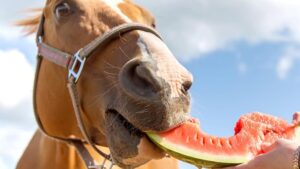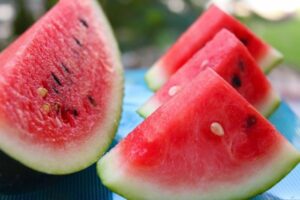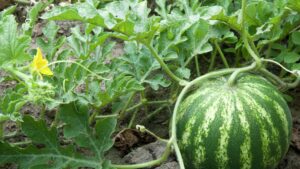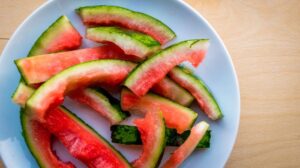Can chickens have watermelon? The answer is yes, and this juicy fruit offers a refreshing and nutritious treat for your feathered friends. Packed with essential vitamins, minerals, and antioxidants, watermelon can contribute to the overall health and well-being of chickens. However, there are a few safety considerations and feeding guidelines to keep in mind to ensure a safe and enjoyable watermelon experience for your flock.
From discussing the nutritional benefits of watermelon for chickens to exploring various feeding methods and frequencies, this comprehensive guide will provide you with all the information you need to make informed decisions about incorporating watermelon into your chickens’ diet. We’ll also delve into the potential impact of watermelon consumption on egg production and quality, and introduce you to some creative alternative watermelon-based treats for your chickens.
Nutritional Benefits of Watermelon for Chickens

Watermelon is a nutritious fruit that can provide chickens with a variety of health benefits. It is a good source of vitamins, minerals, and antioxidants, all of which are essential for the overall health and well-being of chickens.
- Vitamins: Watermelon is a good source of vitamins A, C, and E. Vitamin A is essential for vision, immune function, and reproduction. Vitamin C is an antioxidant that helps protect cells from damage, and vitamin E is important for immune function and nerve health.
- Minerals: Watermelon is also a good source of minerals, including potassium, magnesium, and phosphorus. Potassium is essential for muscle function and nerve conduction, magnesium is important for bone health and muscle function, and phosphorus is essential for bone health and energy production.
- Antioxidants: Watermelon is a good source of antioxidants, including lycopene, beta-carotene, and vitamin C. Antioxidants help protect cells from damage caused by free radicals, which are unstable molecules that can damage cells and DNA.
Overall, watermelon is a nutritious fruit that can provide chickens with a variety of health benefits. It is a good source of vitamins, minerals, and antioxidants, all of which are essential for the overall health and well-being of chickens.
Safety Considerations
While watermelon offers nutritional benefits for chickens, it’s crucial to consider potential risks associated with feeding them this fruit.
Watermelon seeds and rinds can pose choking hazards, especially for smaller chickens. Additionally, excessive consumption of watermelon can lead to digestive issues, such as diarrhea, due to its high water content.
Preparing and Serving Watermelon Safely
- Remove seeds and cut the watermelon into small, bite-sized pieces to minimize choking hazards.
- Offer watermelon in moderation as part of a balanced diet to prevent digestive issues.
- Discard any uneaten watermelon within a few hours to prevent spoilage and potential bacterial growth.
Feeding Methods and Frequency: Can Chickens Have Watermelon
Watermelon can be offered to chickens in various ways to ensure they enjoy this treat and reap its benefits.
Whole Slices
Providing whole slices of watermelon is a straightforward method. Cut the watermelon into slices of appropriate size for your chickens. Place the slices in a designated feeding area or hang them from a perch for easy access.
Diced Pieces
Dicing watermelon into smaller pieces is another option. This method allows for more controlled portion sizes and reduces the risk of overfeeding. Scatter the diced pieces around the coop or run, encouraging foraging behavior and providing mental stimulation.
Blended Juice
For younger chickens or those with difficulty eating solid pieces, blending watermelon into a juice is a suitable alternative. Dilute the juice with water to avoid dehydration and offer it in small quantities to prevent digestive issues.
Frequency and Quantity, Can chickens have watermelon
The frequency and quantity of watermelon offered should be adjusted based on the size and age of your chickens. As a general guideline, small breeds can be given a few slices or a handful of diced watermelon once or twice a week. Larger breeds can have more frequent treats, but it’s important to monitor their intake to avoid obesity or digestive problems.
Impact on Egg Production and Quality

Watermelon consumption may have certain effects on egg production and quality in chickens. It contains nutrients that can contribute to egg development and overall health.
Egg Size and Weight
Watermelon is a source of water and electrolytes, which can help chickens stay hydrated. Adequate hydration is essential for various physiological processes, including egg formation. Consuming watermelon can help chickens maintain proper hydration levels, which may positively impact egg size and weight.
Shell Quality
Watermelon contains calcium, an essential mineral for strong and healthy eggshells. Calcium is a crucial component of the eggshell, providing structural integrity and protection for the developing embryo within. By providing calcium, watermelon can contribute to the production of eggs with thicker and more robust shells.
Nutritional Contributions
In addition to water, electrolytes, and calcium, watermelon also contains other nutrients that can support egg quality. Vitamins A, C, and E are antioxidants that can help protect the eggs from oxidative damage. Folic acid, another nutrient found in watermelon, is involved in cell growth and development, which can be beneficial for egg formation.
Alternative Watermelon-Based Treats
In addition to fresh watermelon, there are several other watermelon-based treats that can provide chickens with a variety of nutrients and benefits.
Nutritional Value and Benefits of Different Watermelon-Based Treats
The following table compares the nutritional value and benefits of different watermelon-based treats for chickens:
| Treat | Nutritional Value | Benefits |
|---|---|---|
| Watermelon Rind |
|
|
| Watermelon Seeds |
|
|
| Watermelon Sorbet |
|
|
Creative Ideas for Incorporating Watermelon into Homemade Chicken Treats
Here are some creative ideas for incorporating watermelon into homemade chicken treats:
- Watermelon Rind Cookies: Mix grated watermelon rind with flour, oats, and honey to create a dough. Cut out cookies and bake until golden brown.
- Watermelon Seed Crackers: Grind watermelon seeds into a fine powder and mix with water and flour to create a dough. Roll out the dough and cut into crackers. Bake until crispy.
- Watermelon Sorbet Popsicles: Puree watermelon and freeze in popsicle molds. These treats are a great way to cool down chickens on hot days.
Final Conclusion

Whether you’re a seasoned chicken keeper or a curious backyard enthusiast, understanding the nutritional value and safety considerations of feeding watermelon to chickens is crucial for maintaining a healthy and productive flock. By following the guidelines Artikeld in this guide, you can confidently offer your chickens this refreshing and nutritious treat, enriching their diet and promoting their overall well-being.
General Inquiries
Can baby chicks eat watermelon?
Yes, baby chicks can eat watermelon in moderation. However, it’s important to introduce it gradually and in small pieces to avoid digestive issues.
How often can I feed watermelon to my chickens?
Watermelon should be offered as an occasional treat, not as a regular part of their diet. A few slices or a small amount of diced watermelon once or twice a week is sufficient.
Can chickens eat watermelon seeds?
Yes, chickens can eat watermelon seeds, which are a good source of fiber and nutrients. However, they should be offered in moderation as they can be a choking hazard.







Leave a Comment